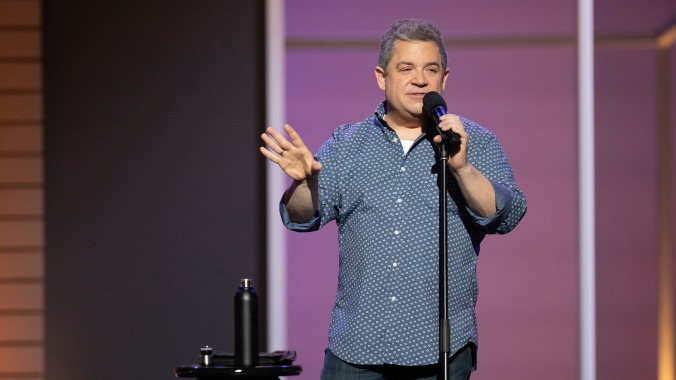Happiness looks good on Patton Oswalt in the charming and wry I Love Everything

Patton Oswalt looks happy. Traversing the stage at the Knight Theater in Charlotte, North Carolina, for his latest Netflix special, I Love Everything, the comedian can’t help but burst into a giant grin repeatedly over the course of his set. Even during his complaints about the horrific nature of the “healthy” breakfast cereals he now makes himself consume in his 50s (“I’m eating cereal that tastes like an unpopular teenager’s poetry”), Oswalt is all smiles. It may seem surprising to longtime fans who still recall the royally pissed-off nerd who launched salvo after whip-smart salvo in the culture wars during his early comedy albums like Feelin’ Kinda Patton or Werewolves And Lollipops. But the man who once raged against the appalling nature of ’80s hair metal seems to have made peace with things—well, except maybe Denny’s.
Actually, this newfound joy might sound even stranger to those who remember Oswalt’s fiercely cathartic set addressing the 2016 death of his wife, writer and journalist Michelle McNamara, as detailed in his most recent stand-up special, 2017’s Annihilation. Since then, he has remarried, and rediscovered the joy of everyday living. After acknowledging that he had initially assumed he would “just exist” after McNamara’s death, he urges the audience—in the most earnest and emotional moment of I Love Everything—to seek out the best reason for living: “If you find love, run toward it.” And all of the jokes that surround that exhortation are suffused with that sense of uplift. Does it sap some of the vicious bite from his wit? Undeniably so. But it also makes it awfully hard not to like spending an hour with the comic; he’s gone from being the antisocial malcontent holding hilarious court at the end of the bar to the funny friend who makes you feel better just by being around. It’s a fair trade.
I Love Everything, for all its easygoing charm, is still instantly recognizable as the work of Oswalt’s free-associative comedic persona. Whether riffing on how the blandly organic makers of his aforementioned breakfast must have begun (“Sorghum Farms was born outside a Phish concert in 1990…”) or inventing lengthy backstories for the tragic-looking characters on the kids’ menu at Denny’s, his penchant for following narrative curlicues down absurdist rabbit holes remains undimmed. But where the punchlines used to live in the outrage that seemed to continually simmer below the surface of every acid observation he made, now Oswalt’s humor is laced with a relatable world-weariness that comes from having been through the wringer, coming out the other side, and being confronted the fact that maybe it’s not worth getting so pissed off about the little things, no matter how irritating. This is comedy borne of fascination, not rage.
That’s not to say some things don’t still make him mad. But Oswalt largely passes by the Trump-shaped elephant in every room, pointing out the nigh-futility of joking about this administration by comparing it to an eighteen-wheeler full of monkeys and PCP that crashed into a train full of diarrhea. “And everybody’s watching it, like, ‘Holy shit, look at this!’ And then you as a comedian walk up and say, ‘Hey, wanna hear a joke I wrote about this?’” Instead, he saves his ire for things like having to miss the Hollywood premiere of Solo: A Star Wars Story, complete with a life-size recreation of the Millennium Falcon you could wander around in, because he had to attend his daughter’s second grade art show. Though even this gets shrugged off with the subsequent realization that his younger self would be fine with this trade-off, given it means he will have sex at some point in the future.
Oswalt ends it all with an epic thought experiment about the time he took his daughter to Denny’s as part of a “Daddy-Daughter Day,” a closing bit that demonstrates the comedian fusing together all the things he does best—unexpected wordplay, imaginative flights of referential fancy, and cutting assessments of humdrum corporate actions that might just be far more sinister than they appear. It’s funny, smart, and imaginative in all the right ways, with a generosity of spirit underlying the cutting nature of the humor. (That generosity extends to his fellow comedian Bob Rubin: Oswalt has attached the stand-up’s set to play right after his.) Patton Oswalt is changing into a different, more empathetic type of comedian, but for those willing to follow along on his new path, there are ample rewards.